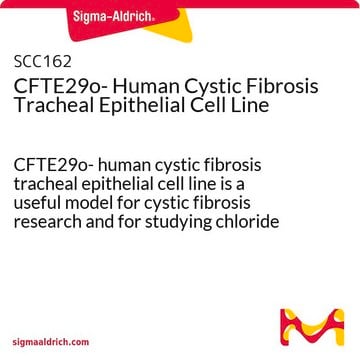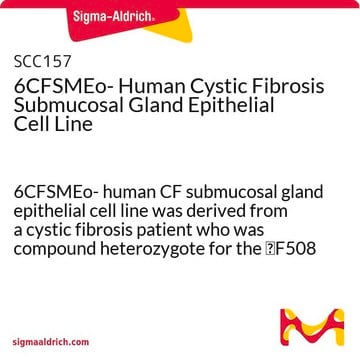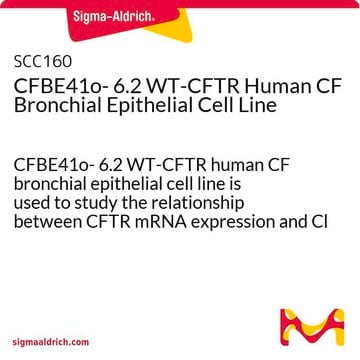SCC155
CFSMEo- Human Cystic Fibrosis Submucosal Gland Epithelial Cell Line
Human
Sinónimos:
CFSMEO
About This Item
Productos recomendados
product name
CFSMEo- Human Cystic Fibrosis Submucosal Gland Epithelial Cell Line, CFSMEo- human CF submucosal gland epithelial cell line was derived from a cystic fibrosis patient who was compound heterozygote for the ΔF508 and Q2X CFTR mutations.
biological source
human
technique(s)
cell based assay: suitable
cell culture | mammalian: suitable
shipped in
ambient
General description
CFSMEo- is a human tracheobronchial submucosal gland epithelial cell line isolated from an individual with CF, who was compound heterozygote for the ΔF508 and Q2X CFTR mutations . ΔF508 mutation is a trinucleotide deletion that results in loss of a phenylalanine at amino acids 508 (ΔF508) in the CFTR protein. This mutation accounts for ~66% of all CF alleles . Q2X mutation is a rare CF mutation in exon 1 of the CFTR gene in which the second codon (CAG) is mutated into the stop codon UAG. The CFSMEo- cell line is the result of pooled colonies that arose from immortalization of the human CF tracheobronchial submucosal gland cells with the origin-of-replication defective SV40 plasmid (pSVori-) .
CFSMEo- retains the characteristic cobblestone morphology of epithelial cells along with cytokeratin expression and the ability to form tight junctions. The cell line expresses vestigial amounts of CFTR mRNA transcripts but does not express detectable levels of CFTR protein . CFSMEo- lacks cAMP-induced Cl- currents .
Cell Line Description
Application
Quality
• Cells are tested by PCR and are negative for HPV-16, HPV-18, Hepatitis A, C, and HIV-1 & 2 viruses as assessed by a Human Essential CLEAR panel by Charles River Animal Diagnostic Services.
• Cells are negative for mycoplasma contamination.
• Each lot of cells is genotyped by STR analysis to verify the unique identity of the cell line.
Storage and Stability
Disclaimer
Unless otherwise stated in our catalog or other company documentation accompanying the product(s), our products are intended for research use only and are not to be used for any other purpose, which includes but is not limited to, unauthorized commercial uses, in vitro diagnostic uses, ex vivo or in vivo therapeutic uses or any type of consumption or application to humans or animals.
Storage Class
10 - Combustible liquids
wgk_germany
WGK 1
flash_point_f
Not applicable
flash_point_c
Not applicable
Certificados de análisis (COA)
Busque Certificados de análisis (COA) introduciendo el número de lote del producto. Los números de lote se encuentran en la etiqueta del producto después de las palabras «Lot» o «Batch»
¿Ya tiene este producto?
Encuentre la documentación para los productos que ha comprado recientemente en la Biblioteca de documentos.
Artículos
16HBE14o- human bronchial epithelial cells used to model respiratory epithelium for the research of cystic fibrosis, viral pulmonary pathology (SARS-CoV), asthma, COPD, effects of smoking and air pollution. See over 5k publications.
16HBE14o- human bronchial epithelial cells used to model respiratory epithelium for the research of cystic fibrosis, viral pulmonary pathology (SARS-CoV), asthma, COPD, effects of smoking and air pollution. See over 5k publications.
16HBE14o- human bronchial epithelial cells used to model respiratory epithelium for the research of cystic fibrosis, viral pulmonary pathology (SARS-CoV), asthma, COPD, effects of smoking and air pollution. See over 5k publications.
16HBE14o- human bronchial epithelial cells used to model respiratory epithelium for the research of cystic fibrosis, viral pulmonary pathology (SARS-CoV), asthma, COPD, effects of smoking and air pollution. See over 5k publications.
Nuestro equipo de científicos tiene experiencia en todas las áreas de investigación: Ciencias de la vida, Ciencia de los materiales, Síntesis química, Cromatografía, Analítica y muchas otras.
Póngase en contacto con el Servicio técnico







